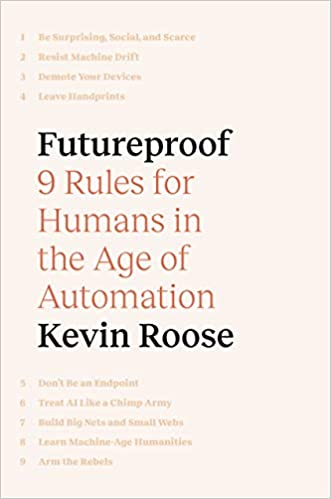You have /5 articles left.
Sign up for a free account or log in.
 Futureproof: 9 Rules for Humans in the Age of Automation by Kevin Roose
Futureproof: 9 Rules for Humans in the Age of Automation by Kevin Roose
Published in March 2021
Futureproof is a book that is less about the future and more about the present. For close readers of the “robots will or will not take all the jobs” genre (count me in), Futureproof offers little that is original.
Those convinced that the future will be one of technological unemployment will not feel any better after reading Futureproof. Nor will those persuaded that society will adjust to new technologies by creating new types of jobs feel any less confident in their beliefs.
Futureproof does a better job at providing advice to those of us trying to navigate the unintended personal and professional consequences of digitization.
Roose, a technology reporter for The New York Times, is up front in documenting all the ways that technology is making us miserable.
Futureproof was written before the pandemic, so there is not much material on the exhaustion of nonstop digitally mediated work. Worrying about phone addiction seems almost quaint in comparison to the nonstop Zoom.
The areas of Futureproof that I found particularly illuminating were Roose’s connections between “hustle culture” and digital platforms. Roose connects the personal productivity and life-hacking movements to the diminishing separation between our work and nonwork. Our laptops, tablets and phones allow us always to be working -- with the result that we are constantly working.
Futureproof would have benefited from a deeper dive into the relationship between work and technology within specific industries.
No surprise, but I would have been thrilled to read Roose try to suss out how technology is changing academic employment. Across colleges and universities, almost every job that can be replaced by software has been eliminated. The results have not been good.
Nowadays, professors and high-level staff spend enormous amounts of time and energy doing the logistical work that administrative support professionals once did. The creative and value-adding work of educating and building new educational programs must compete with the necessary work of coordination and administration.
Futureproof is mostly about how individuals can “futureproof” themselves, both professionally and personally, against technology. And in that goal, the book mostly excels. There is less in Futureproof about how organizations might adapt to a world of intelligent AI.
Getting back to our higher ed example, I hope that we can talk about the consequences of technologically enabled permanent understaffing. Just because we can get away with running things with a lean staffing posture doesn’t mean that we should.
The higher education ecosystem is diverse, but if one thing binds us together, it may be the growing mismatch between the amount of work that needs to be done and the people available to do that work.
If your workday is expanding to evenings and weekends, and you live in fear of “key people” leaving, you are experiencing a systemic rather than local problem. The causes and consequences of understaffing have more to do with macro technological and cultural trends than they do with the specific conditions at your school.
Futureproof is a thoughtful and entertaining read and is worth your time if the book gets you to think (and talk about) the potential impact of new technologies on how work will happen at your institution.
Coming out of COVID, we need to talk about ways that all academics can work differently. The pace that we’ve been working at throughout the pandemic is not sustainable. Technology has made our work more, not less, intense. We need to find a better way.
What are you reading?








